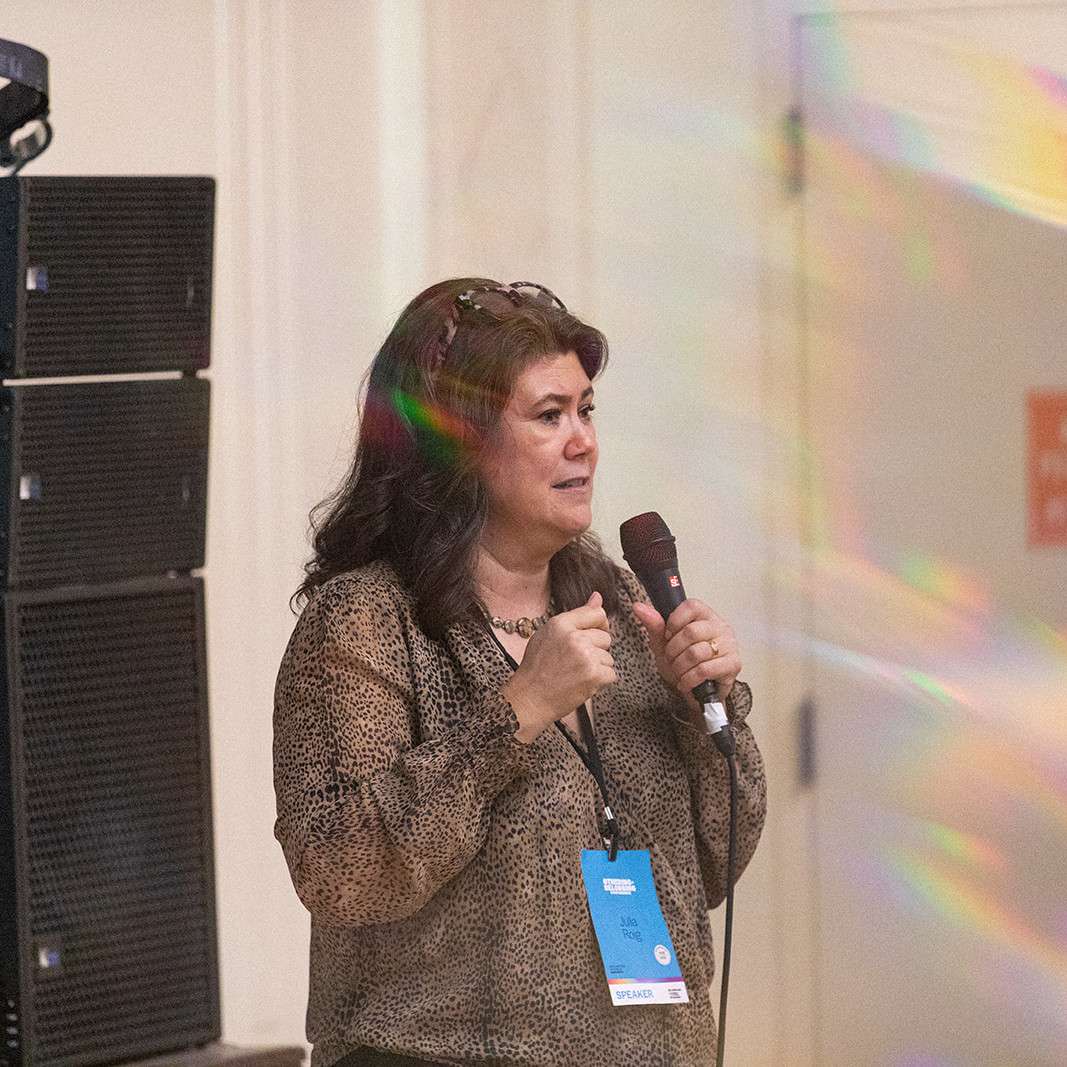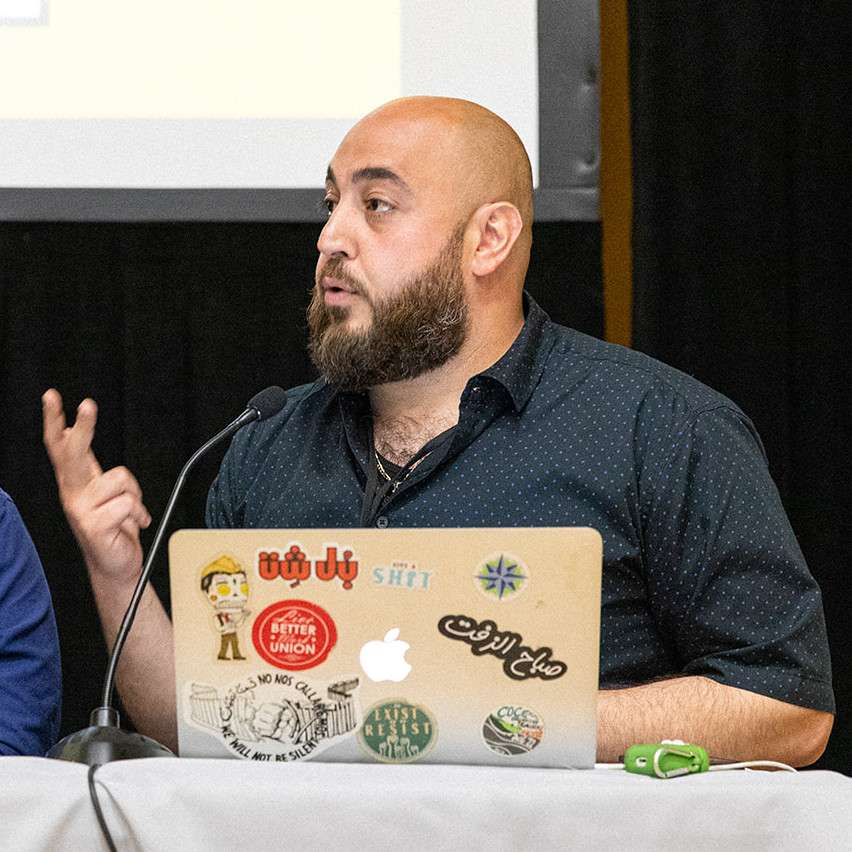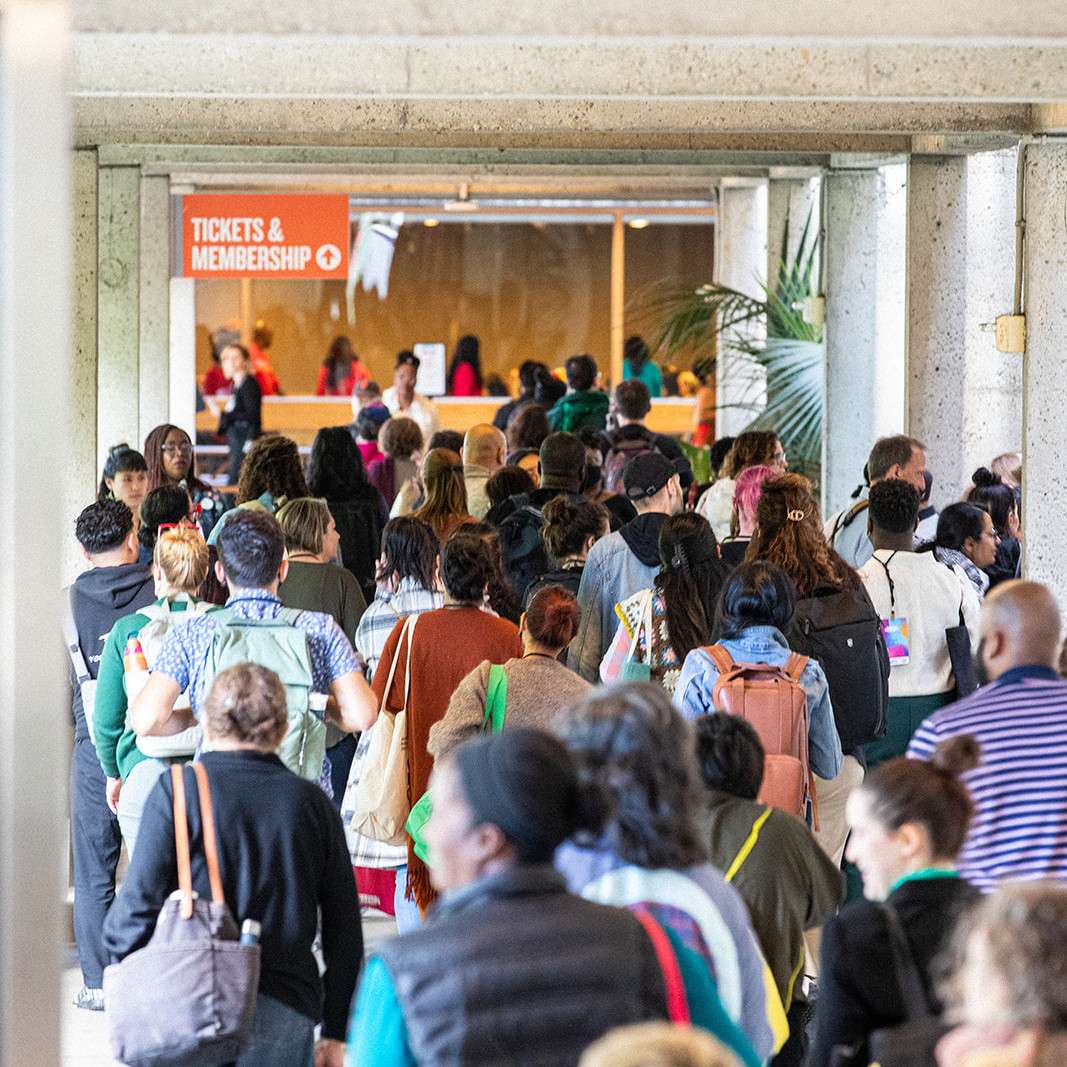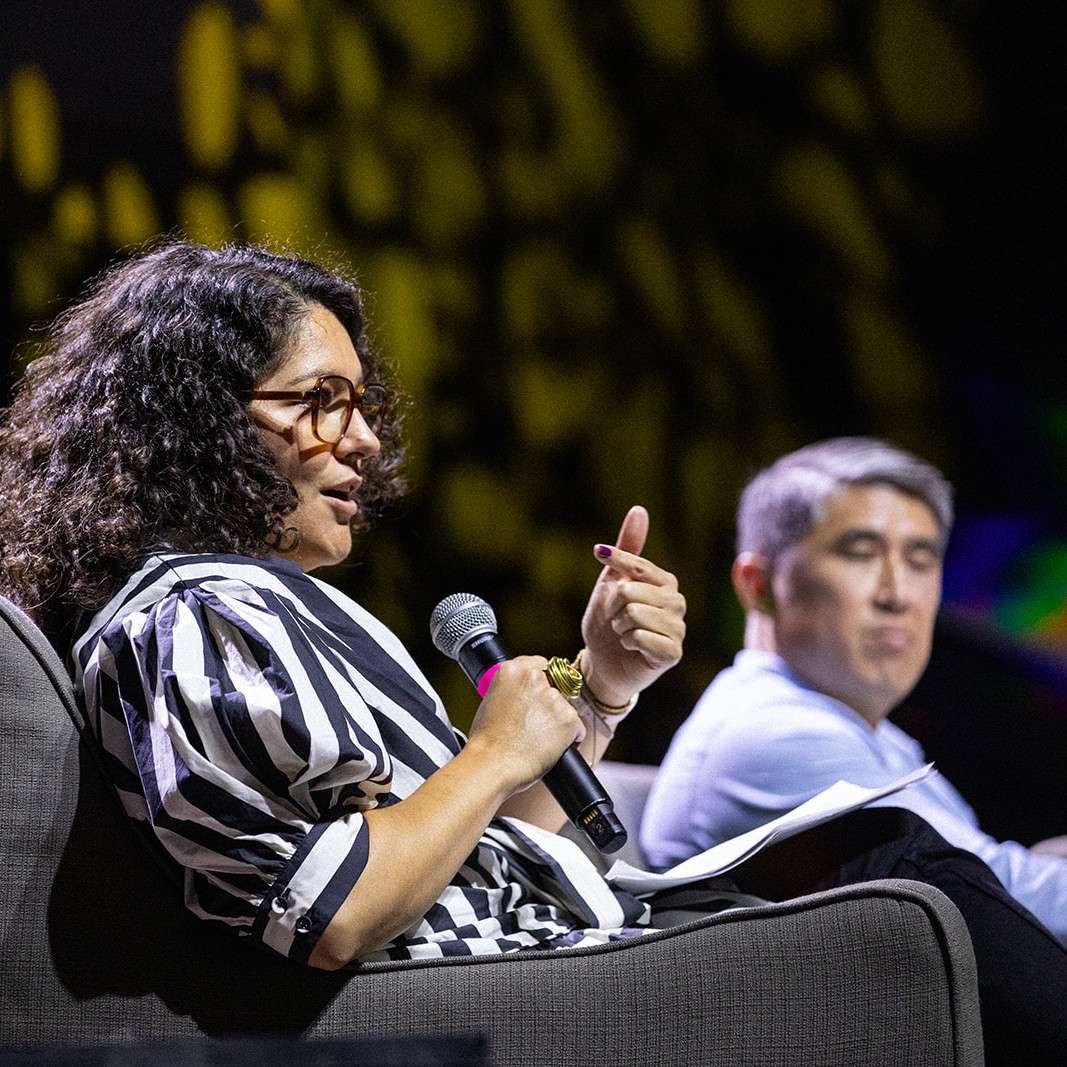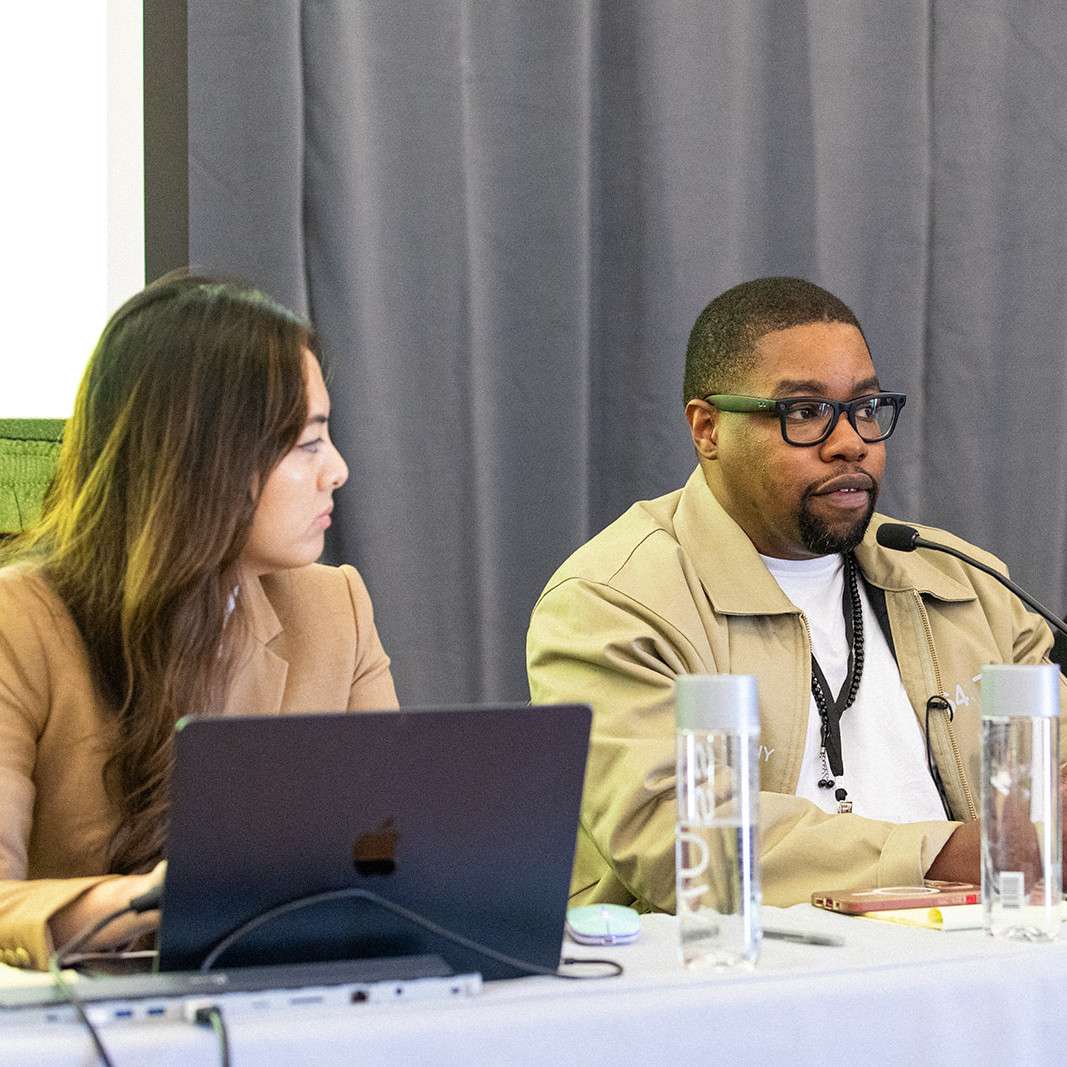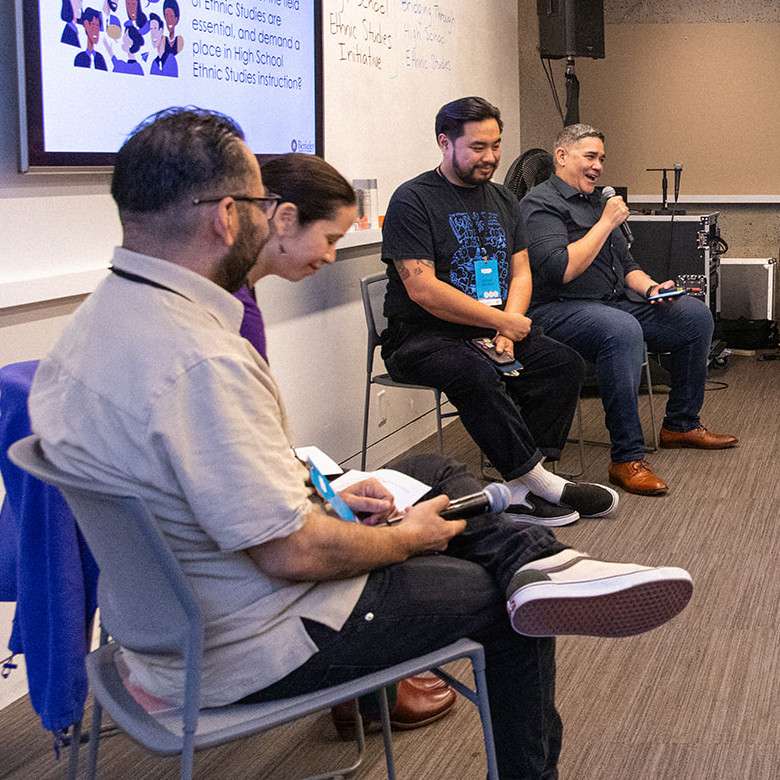Discover Who Belongs?
Who Belongs?

Who Belongs?
Author: Othering and Belonging Institute
Subscribed: 37Played: 121Subscribe
Share
© All rights reserved
Description
Who Belongs? was launched in Fall 2018 as the Othering & Belonging Institute's official podcast. The question of who belongs in our societies, whether local, national, or global, is one of the central drivers that underpin how people are othered, or how the conditions of belonging are created. Our podcast addresses this foundational question to open pathways to explore a range of policies, movements, scholarship, and narratives that get us closer to the goal we seek, which is to advance a society where all belong. For more information visit: https://belonging.berkeley.edu/whobelongs/about
60 Episodes
Reverse
In this episode of Who Belongs? we hear from OBI Director john a. powell and Assistant Director Stephen Menendian about the recently released book they co-authored, called Belonging without Othering: How We Save Ourselves and the World. The interview was conducted by Ivan Natividad, who is OBI's assistant director of communications. Learn more at belonging.berkeley.edu/whobelongs.
For a transcript of the episode, please click here: https://belonging.berkeley.edu/podcast-belonging-without-othering
This episode is part of a series of talks and panel discussions recorded during the breakout sessions of our Othering & Belonging Conference that took place in Oakland this past April. This session is titled "Land, Culture, and Belonging: Place-based Community Advocacy." It looks at the redevelopment of the Henry J. Kaiser Center in Oakland, which was the location of our conference. A private developer who was granted a long-term lease by the city to reopen the venue had negotiated a community benefits agreement with a coalition of local artists. And some of the artists and leaders involved in that process are among the panelists invited to discuss the issue and how it speaks to broader issues of land, culture and belonging. Panelists include Nikki Bas, who is the President of the Oakland City Council; Thomas Cavanagh from the group BANDALOOP; Cristy Johnston-Limón, who leads the City of Oakland’s business development activities; Ayodele Nzinga, who is an artist, actress, playwright, and poet; and Kev Choice, who is a pianist and community advocate. The session was moderated by Eli Moore, who directs OBI's Community Power and Policy Partnerships Program. Eli co-curated this session with OBI's Sarah Crowell. You can find more episodes from this podcast series on our website at belonging.berkeley.edu/whobelongs.
For a transcript of the episode, please click here: https://belonging.berkeley.edu/podcast-land-culture-and-belonging-place-based-community-advocacy
This episode is part of a series of talks and panel discussions recorded during the breakout sessions of our Othering & Belonging Conference that took place in Oakland this past April. This session is titled "Leaning into Paradox: How We Can Block, Bridge & Build Our Democratic Future Together." It includes two speakers from the Horizons Project who engage the audience on those three seemingly paradoxical approaches: how to come together to block the threats to our democratic values; the need to bridge across differences to foster broad-based movements, and to build together the future we want to see. Those speakers are Julia Roig, who is the Founder & Chief Network Weaver at the Horizons Project, and Jarvis Williams, who is the organization's Director for Race and Democracy. You can find more episodes from this podcast series on our website at belonging.berkeley.edu/whobelongs.
For a transcript of the episode, please click here: https://belonging.berkeley.edu/podcast-leaning-paradox-how-we-can-block-bridge-build-our-democratic-future-together
This episode is part of a series of talks and panel discussions recorded during the breakout sessions of our Othering & Belonging Conference that took place in Oakland this past April. This session is titled "Democracy in Crisis: The Courage to Re-Humanize One Another." It focuses on a project called Bridging for Democracy (B4D), which is developing strategies for grassroots organizations working in different parts of the country to bridge across racial, ideological, and urban-rural divides and to strengthen democratic norms at a time of deep social fragmentation and dehumanization. The panelists include Bassem Kawar, who is the Political Director of the Illinois Coalition for Immigrant and Refugee Rights; Lalo Montoya, the Civic Engagement Director with Make the Road Nevada; Ashley Dixon, who is the Rural Georgia Campaigns Lead Organizer at Southern Crossroads; and Ponsella Hardaway, who is the Executive Director of MOSES. The panel was moderated by Mansi Kathuria, who is the Field Strategy and Research Analyst at OBI. Mansi and OBI's Network for Transformative Change curated this session. You can find more episodes from this series on our website at belonging.berkeley.edu/whobelongs.
For a transcript of this episode, please click here: https://belonging.berkeley.edu/podcast-democracy-crisis-courage-re-humanize-one-another
This episode is part of a series of talks and panel discussions recorded during the breakout sessions of our Othering & Belonging Conference that took place in Oakland this past April. This session is titled "Using Data to Advance Belonging without Othering." It looks at a set of domains at the intersection of data and civil society, such as racialized policing and surveillance, housing and eviction, and belonging metrics. Panelists include Amy Lee, who is an organizing member of the Anti-Eviction Mapping Project; Matyos Kidane, who is a community organizer with the Stop LAPD Spying Coalition; and Shadrick Small, who is a researcher at OBI. It's moderated by Stephen Menendian, who is assistant director at OBI. The panel was curated by OBI's Equity Metrics team. You can find more episodes from this series on our website at belonging.berkeley.edu/whobelongs.
For a transcript of the episode, please click here: https://belonging.berkeley.edu/podcast-using-data-advance-belonging-without-othering
This episode is part of a series of talks and panel discussions recorded during the breakout sessions of our Othering & Belonging Conference that took place in Oakland this past April. This session is titled "Expressions of Belonging," and it offers a mix of stories, insights, and diverse approaches to advancing belonging at an array of organizations at different scales and locations. It includes panelists David T. Hsu, who is a Director at Omidyar Network; Liz Baxter, who is the CEO of the North Sound ACH; Cary Simmons, who is the Director of Community Strategies at Trust for Public Land; and Judith Mowry, who is the interim Deputy Director for the Office of Equity and Human Rights in the City of Portland. The discussion was moderated by Ashley Gallegos, who is OBI's Belonging Coordinator. You can find more episodes from this series on our website at belonging.berkeley.edu/whobelongs.
For a transcript of the episode, please click here: https://belonging.berkeley.edu/podcast-expressions-belonging
Episode Note
This episode is part of a series of talks and panel discussions recorded during the breakout sessions of our Othering & Belonging Conference that took place in Oakland this past April. This session is titled "Xenophobia, Resistance, and the Future of the Immigrant Rights Movement." It includes panelists Annette Wong, who is the Managing Director of Programs at Chinese for Affirmative Action; Karim Golding, founder of the Law Library; Lawrence Benito, who is the executive director of the Illinois Coalition for Immigrant and Refugee Rights; and Carlos Perea, who is the Executive Director of the Harbor Institute for Immigrant and Economic Justice. It was moderated by Tracy La, the Executive Director of VietRISE. The panelists share lessons they learned from their years of organizing in the immigrant rights movement, the changing faces of xenophobia in the context of migration, and stories of local communities challenging traditional notions of representation and belonging by winning the right to vote for noncitizens. This session was curated by Tracy La, OBI's Rio Gonzalez, the OBI Network for Transformative Change. You can find more episodes from this series on our website at belonging.berkeley.edu/whobelongs.
For a transcript of the episode, please click here: https://belonging.berkeley.edu/podcast-xenophobia-resistance-and-future-immigrant-rights-movement
Episode Notes
This episode is part of a series of talks and panel discussions recorded during the breakout sessions of our Othering & Belonging Conference that took place in Oakland this past April. This session is titled "Resisting Austerity: Keeping Public Infrastructure Public." It includes panelists Donald Cohen, founder and executive director of In the Public Interest; and Joey Algier, who is the Community Engagement and Communications Coordinator for The Water Collaborative of Greater New Orleans. The panel looks at ways some communities are responding to austerity by restructuring the private sector's relationship with public assets. It was moderated by Wendy Ake, director of Just Public Finance and OBI. You can find more episodes from this series on our website at belonging.berkeley.edu/whobelongs.
For a transcript of the episode, please click here: https://belonging.berkeley.edu/podcast-resisting-austerity-keeping-public-infrastructure-public
Episode Notes
This episode is part of a series of talks and panel discussions recorded during the breakout sessions of our Othering & Belonging Conference that took place in Oakland this past April. This session is titled "Bridging Through High School Ethnic Studies," and was curated by OBI's Hossein Ayazi. It includes panelists from the UC Berkeley High School Ethnic Studies Initiative, Julie Yick, Mike Espinoza, Jason Muñiz, and antmen pimentel mendoza. Together with the audience they explore concepts that are essential to high school ethnic studies courses, discuss what those concepts look and feel like, and how to effectively bring them into the classroom. The discussion is facilitated by Victoria Robinson, the director of the American Cultures Center at UC Berkeley. Find more episodes from this series on our website at belonging.berkeley.edu/whobelongs.
For a transcript of the episode, please click here: https://belonging.berkeley.edu/podcast-bridging-through-high-school-ethnic-studies
Episode Notes
In this episode of Who Belongs? we hear from Darrell Owens, who is a policy analyst at California Yimby, and a writer on Substack who focuses on housing, planning, displacement, mobility and other issues. He just authored a new piece called Segregation or Integration which combines data on housing policy with his personal experiences growing up in Berkeley living in different neighborhoods. And we also have with us Stephen Menendian who will give us his thoughts on the article. Stephen is our assistant director here at OBI who has published extensively on issues related to segregation and housing. Read Darrell's article here: https://darrellowens.substack.com/p/segregation-or-integration
For a transcript of this episode, please click here: https://belonging.berkeley.edu/podcast-does-integration-close-racial-disparities
In this episode, we speak with Sharon Dunn and Gwen Johnson — two members of Hands Across the Hills (HATH), a grassroots group working to build bridges between communities in rural Western Massachusetts and in the Eastern Kentucky coal country. Formed in the wake of the 2016 election, this group seeks to build empathy and unity between diverging perspectives through structured dialogue and cultural exchange. Sharon and Gwen share their experiences and the lessons they draw, illuminating how a breaking dynamic can shift to bridging — and move towards belonging — through deep conversation, care, and resiliency.
This episode of Who Belongs? is part of a new series of podcasts focused on telling bridging stories. Throughout the series we’ll talk to leaders implementing bridging work and individuals who have experienced the bridging transformation. This project is led by OBI’s Blueprint for Belonging project (B4B) and typically hosted by program researcher Miriam Magaña Lopez. However, this episode is hosted by OBI Summer Fellow Nicole Li. Visit our website at https://belonging.berkeley.edu/bridging-belonging-case-series to explore all of the case studies in the Bridging to Belonging series. For a transcript of this podcast, click here: https://belonging.berkeley.edu/podcast-building-bridges-over-hills.
Intro and outro music are by Chad Crouch.
Find out more at http://belonging.berkeley.edu/whobelongs
Welcome back to Cultures of Care, a special new miniseries from Who Belongs? hosted by Evan Bissell and Giovanna Fischer. This series celebrates people that practice collective care in unconventional and insurgent ways. Visit the project, read more about our interviewees, and check out transcripts for this episode at https://belonging.berkeley.edu/cultures-of-care. In this episode, we hear from photographer Naima Green and DJ Rich Medina. Naima is an artist, photographer and educator from New York. Her work is an invitation to participate, observe and consider safety, utopia and intimacy. You can view her work here at http://www.naimagreen.com/, and follow her on social media on Twitter, @naimapatrice, and on Instagram, @naimagreen/. Rich is a world-renowned, Philadelphia-based DJ, producer, poet, journalist, and lecturer on hip hop and music theory. Since the onset of the Covid-19 pandemic, Rich has been cultivating a vibrant online space for a globe-spanning community to gather, listen, dance, meditate, and tap into collective joy and release during a time of social isolation. You can see visit his website at https://richmedina.com/ and follow him on Instagram @richmedina. These interviews were edited by Majo Calderon and adapted for podcast by Erfan Moradi, with original music created by Alex Lemire Pasternak. Additional music in this episode is by Mini Vandals, Bad Snacks, Emily Sprague, and Silent Partner. Thanks for listening!
For a transcript of the episode, please click here: https://belonging.berkeley.edu/podcast-cultures-care-ep-2-naima-green-and-rich-medina
In this episode of Who Belongs?, we're debuting Cultures of Care, a special new miniseries hosted by Evan Bissell and Giovanna Fischer. This series celebrates people that practice collective care in unconventional and insurgent ways. Care is an essential, immediate and practical way to create belonging. Perhaps most vitally in our urgent times, at the heart of each profile you will find provocations that are seeds for reshaping society and how we relate to each other and the world. Visit the project, read more about our interviewees, and check out transcripts for this episode at https://belonging.berkeley.edu/cultures-of-care. We spoke with Nicki Jizz and Kristina Wong for this episode. Nicki is a Black, San Francisco-based drag queen who founded Reparations: an all-Black Drag Show in June of 2020. In the monthly online show, Nicki creates a vibrant online space centered around beautiful, hilarious, thought-provoking and sensual performances by Black performers. Check out Reparations at Oasis here, https://www.sfoasis.com/reparations, and follow Nicki on her social media to keep up with her work: @nicki_jizz on Instagram and @nickijizz on Facebook. Kristina is a comedian and performance artist who founded the Auntie Sewing Squad, a network of hundreds of Aunties across the United States who have sewn and shipped tens of thousands of masks to First Nations, farmworkers, migrants seeking asylum, incarcerated communities and poor communities of color. Learn more about the Aunties here at their website, http://auntiesewingsquad.com/, and keep up with Kristina's work here at https://www.kristinawong.com/. These interviews were edited by Majo Calderon and adapted for podcast by Erfan Moradi, with custom music created by Alex Lemire Pasternak. Additional music in this episode is by Emily Sprague, Puddle of Infinity, and Silent Partner. Thanks for listening!
For a transcript of the episode, please click here: https://belonging.berkeley.edu/podcast-cultures-care-ep-1-nicki-jizz-and-kristina-wong
In this episode we speak with two of the founding members of the Florida Rights Restoration Coalition, the President Desmond Meade and the Political Director Neil Volz. Together, Desmond and Neil have been working on restoring the rights of people who have a prior felony conviction, referred to as returning citizens. In 2018, they were successful in passing amendment 4 that restored the right of over 1.4 million Floridians to vote. How were they successful getting 65% of Floridians to support this amendment? Bridging. In this episode Desmond and Neil discuss their personal path into this work and how they successfully led a campaign through bridging that returned citizens and accordingly restored their right to vote. This episode of Who Belongs? is part of a new series of podcasts focused on telling bridging stories. Throughout the series we’ll talk to leaders implementing bridging work and individuals who have experienced the bridging transformation. This project is led by OBI’s Blueprint for Belonging project (B4B), and this episode is hosted by strategy analyst Gerald Lenoir. This project is funded by The Annie E. Casey Foundation, Inc. Visit our website at https://belonging.berkeley.edu/bridging-belonging-case-series to explore all of the case studies in the Bridging to Belonging series.
For a transcript of the episode, please click here: https://belonging.berkeley.edu/podcast-returning-citizens
In this episode we speak with Reverend Ben McBride. Ben McBride is a spiritual leader and longtime activist for peace and justice in the Bay Area. McBride serves as a national leader around reconstructing public safety systems and gun violence prevention work. In 2014, McBride launched the Empower Initiative to support bridging and belonging work across the country. McBride shares how he conceptualizes the building, bridging, belonging, and becoming frameworks. He outlines how cultural and structural belonging can occur, and the role that we each can play in creating a world where everyone belongs. This episode of Who Belongs? is part of a new series of podcasts focused on telling bridging stories. Throughout the series we’ll talk to leaders implementing bridging work and individuals who have experienced the bridging transformation. This project is led by OBI’s Blueprint for Belonging project (B4B), and this episode is co-hosted by program researcher Miriam Magaña Lopez and EJ Toppin. This project is funded by The Annie E. Casey Foundation, Inc. Visit our website at https://belonging.berkeley.edu/bridging-belonging-case-series to explore all of the case studies in the Bridging to Belonging series.
For a transcript of the episode, please click here: https://belonging.berkeley.edu/podcast-co-creating-future-where-everyone-belongs
In this episode we interview with Debbie Lacy. Debbie is the founder of Eastside for All, which serves communities outside of Seattle, WA including Bellevue, Kirkland, Redmond, Issaquah and Sammamish. Eastside for All has a mission to transform East King County into a place where racial, economic and social justice are realized, and belonging is made possible for communities of color. Debbie shares about her Build for Belonging Initiative and specifically her use of the co-creation framework as she advocates to build a cross-cultural center with belonging in mind. This episode of Who Belongs? is part of a new series of podcasts focused on telling bridging stories. Throughout the series we’ll talk to leaders implementing bridging work and individuals who have experienced the bridging transformation. This project is led by OBI’s Blueprint for Belonging project (B4B), and hosted by program researcher Miriam Magaña Lopez. This project is funded by The Annie E. Casey Foundation, Inc. Visit our website at https://belonging.berkeley.edu/bridging-belonging-case-series to explore all of the case studies in the Bridging to Belonging series.
For a transcript of the episode, please click here: https://belonging.berkeley.edu/podcast-co-creating-public-spaces-belonging
In this episode we speak with Angel Mortel and Aleena Gonzalez. Angel is a lead organizer with LA Voice, which is a multi-racial and multi-faith community organization that awakens people to their own power and trains them to organize together. LA Voice has been implementing the Belong Circles with their partner network, including at Dolores Mission Church. Aleena Gonzalez is a high school student that is part of the Dolores Mission community who has participated in Belong Circles and is now leading circles with other young people. In the last episode we spoke with Ashlin Maluuf-Gashaw from PICO California about the design and intention of the Belong Circles. Angel and Aleena will both share with us what the Belong circles have meant to them as organizers and participants. This episode of Who Belongs? is part of a new series of podcasts focused on telling bridging stories. Throughout the series we’ll talk to leaders implementing bridging work and individuals who have experienced the bridging transformation. This project is led by OBI’s Blueprint for Belonging project (B4B), and hosted by program researcher Miriam Magaña Lopez. This project is funded by The Annie E. Casey Foundation, Inc. Visit our website at https://belonging.berkeley.edu/bridging-belonging-case-series to explore all of the case studies in the Bridging to Belonging series.
For a transcript of the episode, please click here: https://belonging.berkeley.edu/podcast-belong-circles
In this episode we speak with Ashlin Malouf-Gashaw. Ashlin is the Chief Formation Officer at PICO California, the largest multi-racial faith-based community-organizing network in the state. PICO is leading The Belong Movement, which aims to address the polarization and racial anxiety across California by bridging across race, faith and status through facilitated Belong Circles. Ashlin shares the intention and design behind the Belong Circles, and how anyone, including our listeners can implement them in their own community. To learn more about Belong Circles go to picocalifornia.org. This episode of Who Belongs? is part of a new series of podcasts focused on telling bridging stories. Throughout the series we’ll talk to leaders implementing bridging work and individuals who have experienced the bridging transformation. This project is led by OBI’s Blueprint for Belonging project (B4B), and hosted by program researcher Miriam Magaña Lopez. This project is funded by The Annie E. Casey Foundation, Inc. Visit our website at https://belonging.berkeley.edu/bridging-belonging-case-series to explore all of the case studies in the Bridging to Belonging series.
For a transcript of the episode, please click here: https://belonging.berkeley.edu/podcast-belong-movement
In this episode we speak with Roberto Bedoya. Roberto is the Cultural Affairs Manager for the City of Oakland in California. He developed the City’s Cultural Plan, titled, Belonging in Oakland. Throughout his career Roberto has consistently advocated for inclusion and belonging in the cultural sector. In our conversation, Roberto shares how he’s utilized belonging in his city planning work through intentional grant giving, and encouraging city departments to re-think how Oakland residents interact with each other and with physical spaces around the city. This episode of Who Belongs? is part of a new series of podcasts focused on telling bridging stories. Throughout the series we’ll talk to leaders implementing bridging work and individuals who have experienced the bridging transformation. This project is led by OBI’s Blueprint for Belonging project (B4B), and hosted by program researcher Miriam Magaña Lopez. This project is funded by The Annie E. Casey Foundation, Inc. Visit our website at https://belonging.berkeley.edu/bridging-belonging-case-series to explore all of the case studies in the Bridging to Belonging series.
For a transcript of the episode, please click here: https://belonging.berkeley.edu/podcast-belonging-oakland
In this episode we speak with Tamia Dantzler & Dashley Concepcion. Tamia is an alum and Dashley is a current student at El Puente Academy for Peace and Justice. In a previous episode we spoke with Frances Lucerna, founding principal of El Puente Academy for Peace and Justice. We heard from Frances about the school design and intentions, in this conversation Tamia & Dashley share with us their personal experience. They tell us what it has meant to be students at a school that makes them feel seen and heard. This episode of Who Belongs? is part of a new series of podcasts focused on telling bridging stories. Throughout the series we’ll talk to leaders implementing bridging work and individuals who have experienced the bridging transformation. This project is led by OBI’s Blueprint for Belonging project (B4B), and hosted by program researcher Miriam Magaña Lopez. This project is funded by The Annie E. Casey Foundation, Inc. Visit our website at https://belonging.berkeley.edu/bridging-belonging-case-series to explore all of the case studies in the Bridging to Belonging series.
For a transcript of the episode, please click here: https://belonging.berkeley.edu/podcast-being-seen-and-heard




